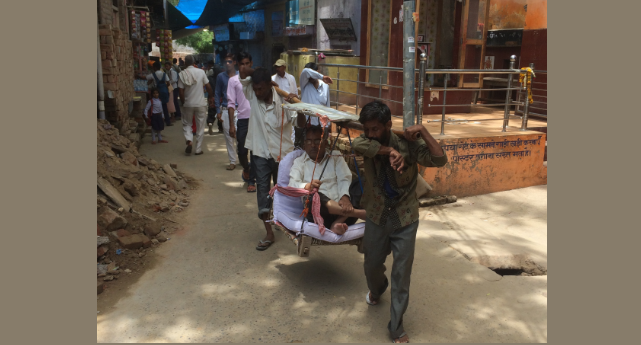The Palkiwallahs of Barsana
ANANT GUPTA
42 kms from Mathura, Barsana is believed to be the birthplace of Radha. The locals are proud that Holi celebrations throughout the country commence only after Barsana has celebrated the festival in its Radha Rani Temple. The temple is the main attraction for pilgrims visiting this village. Unlike the Krishna Janmabhoomi complex in Mathura, there is no deployment of security personnel here. Lord Krishna’s dearest Gopi seems to be facing no security threat.
The temple is situated at an elevation. One way to reach the temple is to climb 285 steps along a narrow, winding trail. The steps are relatively steeper if you opt for the broader way with colourful shops selling bhajan casettes, prasad for offering and other supplies for temple rituals. But for the elderly, the disabled and the lazy ones, there exists a unique alternative to the steps: the palkiwallahs of Barsana.
The Palki or the Doli is the swadeshi form of a sedan chair carried by two men. The seat is suspended by ropes from a bamboo stick that is lifted on a shoulder by the palkiwallahs at the two ends of the stick. The seat is cushioned well for the comfort of the pilgrims. There are 50 such palkis around the Radha Rani Temple in Barsana. Each Palki bears a number that the Palkiwallahs have collectively allotted it. The rate for taking a pilgrim up the stairs and then bringing him/her down varies from Rs.200-400 depending on the weight of the pilgrim.
Bal Kishan, who is in his 50s, has been doing this work for 35 years. He has no complains and takes pride in his fitness. “I have never fallen sick in all these years,” he says. But Bhoodev, another Palkiwallah, tells a different story. “I have been doing this for 20 years now. There are days when we get not a single customer. This can go on for a couple of days also. Then when I have to carry someone, my back hurts.” Bhoodev is a resident of Govardhan which is 20 kms away from Barsana. He is a father of three. It is 1 in the afternoon and there have been no customers today so far.
Pawan is 24 years old and unmarried. “I want to get out of this place. But you know how expensive to live in cities,” he says. When asked about his skills he says without hesitation that he can do anything. “Just take me with you from wherever you are. Dilli? Bombay?” he winks at me. “We don’t do it. I know people who do it. My people. But I don’t,” he says in response to a question about construction work.
The first impression is that the Palkis must be for the old and the disabled only. But Pawan says: “A lot of young people like you do it for the fun of it. We get more young customers than old ones. We make Rs.300-350 in a day on an average.”
“Some pilgrims are very kind. They don’t just pay us. They give us food also,” Bhoodev says. “But there is a severe lack of opportunities here for unskilled labourers like us. Ours is a profession of uncertainty,” Bhoodev complains. He seems to be unhappy unlike Pawan who likes his lassi too much. “But it doesn’t matter. We are doing God’s work here,” he says with a smile.





